This article is more than 5 years old.
It was great to be back at an ACRL Conference after an 8 year hiatus. I repeatedly wondered why I let myself miss the past three conferences as I reconnected with colleagues and friends from elsewhere, attended thought-provoking sessions, and enjoyed exploring a new-to-me city. The energy and excitement of a *big* conference are rejuvenating for me, and I am not going to miss so many consecutive ACRLs in the future!
What I Learned
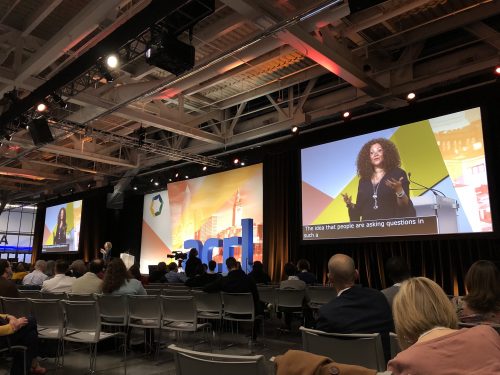
Since my last ACRL in 2011, things have changed–a LOT. Beyond the overall vibe being different (more relaxed!), the track of most interest to me, Scholarly Communication, is now mainstream, evolving from its “what is this?” early days* to assuming knowledge for informed discussion about advocacy and outreach efforts, especially around open ed. I attended sessions on understanding grad students’ research data management needs; NCSU’s open textbook project; building services through faculty surveys; and the ACRL Scholarly Communication Research Agenda, which is being rolled out later this year.
A theme I found running throughout the conference, including the Scholarly Communication track, was social justice. There were many, many presentations about social justice work in libraries, about equity, diversity, and inclusion (EDI), and about our need to decolonize our profession. Not surprising given the conference theme of “Recasting the Narrative,” Lauren Pressley’s presidential year focus on EDI, and the three keynote speakers. Not surprising, but still so encouraging.
The two standout sessions I attended both addressed social justice issues in our work, one specifically in open education and the other in our perception of librarianship. Each deserves their own blog post, but I’ve pulled out the highlights below, along with notable thoughts / points / ah-ha’s from other sessions.
Highlights
Beyond Free: A Social Justice Vision for Open Education
Rajiv Jhangiani, Special Advisor to the Provost on Open Education and Professor, Kwantlen Polytechnic University
- Higher education replicates & reinforces existing power structures
- No other consumer good has risen in cost as sharply or as high as textbooks
- If students can’t afford course materials, can’t access course materials, then who is higher ed for?!
- Openwashing: appearance of open-source & open-license for marketing appearance sake; inclusive has been co-opted
- Not just about equitable access to knowledge but equitable access to knowledge creation
- Increasing access is not the same as lowering cost
- Digital redlining: digital is not the only or best answer
- There is no such thing as innocent data collection
- Invisibility of labor in OER creation is a problem
- OER does not magically flatten hierarchies
- 5Rs for Open Pedagogy: Respect, Reciprocate, Risk, Reach, Resist
- Not just about access but about equity
Kyle was also in this session and I’m sure other things stood out to him, but I think I can safely speak for both of us that Dr. Jhangiani was inspiring and thought-provoking, and that either / both of us would be delighted to brainstorm OER outreach at ZSR with anyone interested!
Becoming a Proud “Bad Librarian”: Dismantling Vocational Awe in Librarianship
Fobazi M. Ettarh, Undergraduate Success Librarian, Rutgers University Newark
- Is librarianship an occupation or a vocation? An occupation is something you can leave at home [i.e., go on vacation], but a vocation is forever with you wherever you go
- For some, librarianship clearly seen as a vocation
- Sacrifice and struggling shouldn’t be the goal or be required to be a good librarian
- Assumed that libraries are: inherently good; inherently sacred; beyond critique–but not for all
- Libraries assumed the last bastion of democracy, but in a real democracy no job is above critique
- Setting boundaries makes you a bad librarian
- Overwork has become a badge of honor
- Speaking out about injustices makes you a bad librarian
- Organizations and individuals normalize, enact, and reinforce white supremacy through: defensiveness; right to comfort (e.g., civility and professionalism); worship of the written word
- While the institution can always produce another person, you cannot produce another you
A P.K. (pastor’s kid), Fobazi Ettarh situated her talk on being a “bad librarian” against the backdrop of religious callings and patron saints, which was an effective framework for juxtaposing approaching librarianship as an occupation vs. a vocation. Ms. Ettarh did a wonderful job–at 8:30am on a Saturday no less!–of speaking to why we need to embrace being bad librarians, and why we need to be mindful of not using vocational awe language in describing our work. I have been guilty in the past of speaking about my work as a librarian in vocational awe terms, in labeling it “a calling” or “a passion,” without giving thought to what those phrases signal, both to myself and to others. I am not, and none of us should be, on-call to ZSR 24/7 (much as we enjoy working here!). It simply isn’t sustainable. Nor is it what is asked of us, thankfully. Ms. Ettarh’s definition of a bad librarian as someone who questions and criticizes libraries’ practices when they are upholding white supremacist structures; as someone who sets personal boundaries around email on nights and weekends–and absolutely on vacations; as someone who speaks out in order to avoid burnout…if that’s a bad librarian, then let me be a bad librarian, too. Let’s all be bad librarians! Obviously there are times of exception, which were acknowledged, but I was thrilled that there was a packed room on the last morning of the conference to hear affirmation that being a librarian does not require sacrificing yourself and burning out.
Standout Thoughts / Points / Ah-Ha’s
- Many people in positions of leadership are there because they’ve intentionally not touched diversity & inclusion issues (Michele Norris keynote)
- Graduate students conflate research data management with the research process, in part because they tend to only see parts of the system and not the larger whole (Understanding Graduate Students’ RDM Needs session)
- Faculty perceive that cost is driving OER adoption, not quality; tone, voice, & consistency are markers of quality in a textbook and something publishers address during editing; good doesn’t equal publisher brand but publisher services; this is something for OER advocates to ponder… (Open Textbook Project session)
- Think about how working with student workers can empower social justice work in libraries (Social Justice as a Core Library Value session)
- There is work to be done in equity and inclusion issues when we are decolonizing scholarly communication–the “Global South” doesn’t refer to themselves as such (ACRL Scholarly Communication Research Agenda session)
- “Sometimes truth is about as appealing as raw tempeh.” (Alison Bechdel keynote)
Road-tripping & Sightseeing
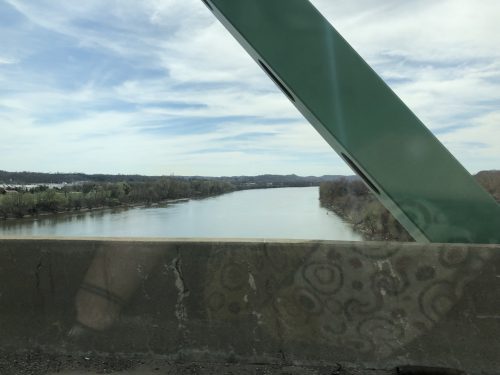
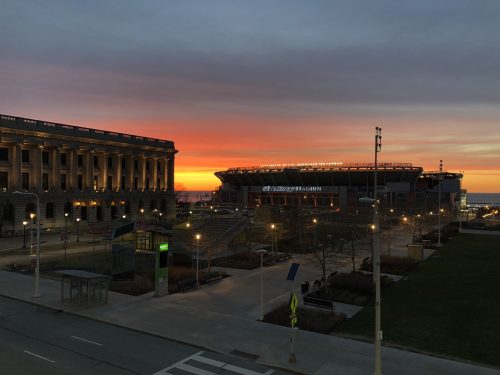
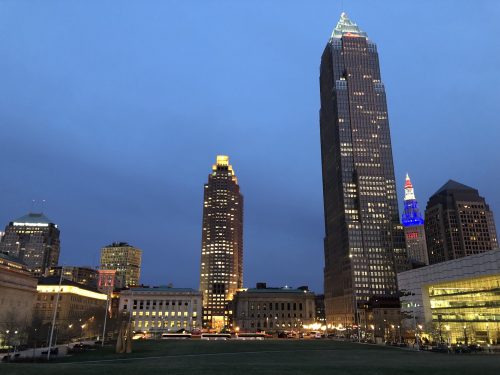
Finally, no good conference is complete without a little bit of sightseeing, and an 8.5 hour road trip provided plenty of time for sights, stories, sing-alongs, and a good ol’ fashioned game of Oregon Trail via text between Wagon 1 (Kathy, Meghan, Summer, & me) and Wagon 2 (Kyle, Roz, Mel, & Mary Beth; thanks to Kyle for giving me a broken leg!). I thoroughly enjoyed walking around downtown Cleveland and sitting outside during breaks for fresh air and strong breezes coming off Lake Erie. And Friday night’s views were incredible!
Final Thoughts
ACRL is a wonderful conference and I am grateful I returned. I encourage anyone who’s never attended to consider going in 2021! However, since it’s in Seattle, I don’t think I’ll be road-tripping for that one…
*I attended my first ACRL Conference in Baltimore in 2007 expressly because there was a highlighted session on scholarly communication. I believe it was one of three, total. That room was maybe a quarter full. It’s a different world 12 years later!
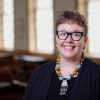
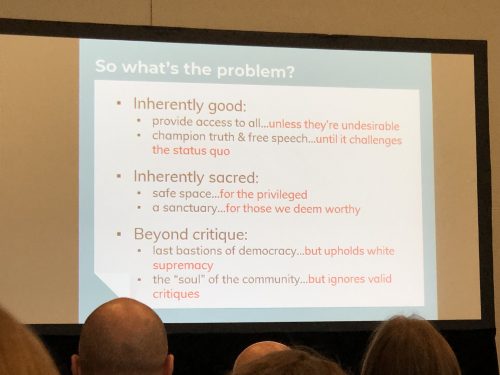
6 Comments on ‘Molly at ACRL’
I love your thought provoking post. Especially the emphasis on social justice issues. Your reflections on being a “bad librarian” juxtapose nicely with the contents of Amanda’s “Why we leave” session, and give plenty of food for thought. I also found the OER sessions invigorating. I think we need to put some effort into making things happen, even for this fall semester! Let’s put our collective heads together.
Molly, thank you for this thoughtful post! Your list of standout points really resonated with me. For me, this was my best ACRL to date, this conference just gets better every time!
Thank you for the thought provoking and detailed highlights Molly! I’ll find a way to wiggle my way to ACRL in 2021.
Great highlights, Molly! Ettarh has also written about vocational awe, if anyone is interested in delving in a little more – http://www.inthelibrarywiththeleadpipe.org/2018/vocational-awe/
Thanks, Molly!
That bridge from WV into Ohio is so iconic, I knew it right away! 🙂
Anyways, great write up! I missed those sessions so it was great to catch up and read about them, thank you!